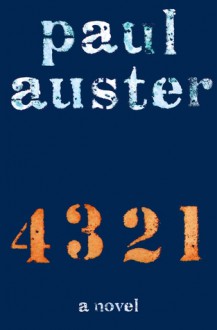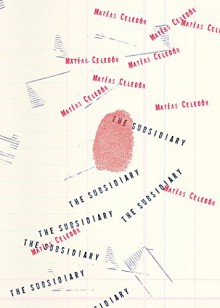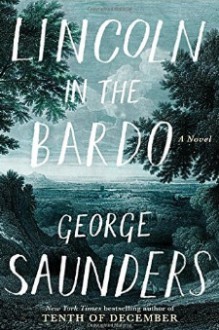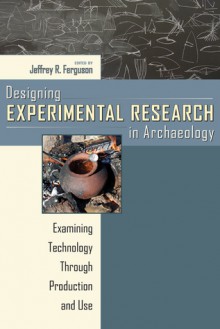
Thanks to NetGalley and to Faber & Faber for providing me with an ARC copy of this novel that I freely chose to review.
I’ve been following with interest the Man-Booker Prize this year and realised I had quite a few of the books on my list to be read and decided to try and read in a timely manner and see how my opinion compared to that of the judges. When the shortlist was announced, only one of the books I had read so far had made it, Exit West by Mohsin Hamid, a book I really enjoyed. And then I got the chance to read 4 3 2 1 by Paul Auster, another one of the novels shortlisted, and I could not resist.
I had read a novel by Paul Auster years back, The Book of Illusions and although I remember I enjoyed it, I had never read another one of his books until now. It wasn’t a conscious decision, and I had always kept in mind that at some point I should pick up another one of his books but that day hadn’t arrived.
I hadn’t read anything about this novel before I started reading it, other than it had been shortlisted for the Man-Booker, and therefore I was a bit surprised and confused, to begin with.
First, as happens with e-books, I had no idea how long it was. It’s around the 900 pages mark. Second, I didn’t realise it was a fairly experimental novel, or, at least its structure was not standard. The novel starts as if it was going to be a family saga, with the story of a Jewish immigrant arriving in New York, and we follow his story and that of his family for a couple of generations until we get to the birth of a boy, Archibald Ferguson. He doesn’t like his first name that much and for the rest of the novel he is referred to as Ferguson. When things start getting weird is when at some point you become aware that you are reading four different versions of his life. These are narrated in the third person, although always from the point of view of the character, and yes, they are numbered. So the first chapter (or part), you would have 1.1, 1.2, 1.3, 1.4 and then, the next part would be 2.1… and so on. The story (stories) are told chronologically but chopped up into bits. Some of the reviewers have commented that you need to be a member of MENSA to remember and differentiate the various stories, because yes, there are differences (fate seems to play a big part, as sometimes due to incidents that happen to his family, financial difficulties, relationship issues… the story takes a different turn and deviates from the other versions), but these are not huge, and it is difficult to keep in your mind which one of the versions is which one (at times I would have been reading for a while before I could remember how this version was different to the one I had just been reading). Because the differences are not major (yes, in one version he ends up going to a university and in another to a different one, in one he works at a newspaper and in another starts writing books, in one he goes out with a girl and in another they are only friends…), and the characters are pretty much the same in all versions (although sometimes their behaviour is quite different) it makes the stories very similar. Added to that, all versions of the character are also very similar as if the different circumstances were not earth-shattering and had not affected that much the development of his boy (in the debate of nature, nurture, it’s safe to say Auster supports nature). The devil seems to be in the detail, or perhaps the point is that we might strongly believe that there are moments when our decisions could have sent us down one path or a completely different one (Sliding Doors anyone?), but the truth is that of all the infinite possibilities (and that makes me think of a book I read very recently, Do You Realize?) only one is conducive to life as we know it (the Goldilocks theory of life. Neither too hot nor too cold, just right) and our life was meant to be as it if.
Ferguson loves films and is a bit of a film buff (there are lengthy digressions about Laurel & Hardy, the French New Wave, American Films…), he also loves books and writing, and some versions of the story include his translations of French poets, or his own stories (that sometimes end up being exactly the same as the story we are reading, and others are either full stories or fragments of the books he is writing), and sports, mostly baseball, although also basketball.
Towards the end of the book (well, it’s a long book, so let’s say from the time the characters goes to college), we get much more detailed information about politics and historical events in America. There are lengthy descriptions of reactions to the murders of J.F.K, Martin Luther King, Robert Kennedy, race riots, the Black Power Movement, the Vietnam War and the anti-war movement, the Columbia University demonstrations and student political organisations, and also about New York and Paris (more New York than Paris) in the 1960s and early 70s. Although in one of the versions Ferguson is attending Columbia, he is a reporter and even when he is physically there, he narrates the events as an observer rather than as if he was personally involved. His engagement seems to be intellectual above all, no matter what version of Ferguson we read, although the reasons for his attitude might be different.
I don’t want to end up with a review as long as the book itself, and after checking other reviews of the book, I thought I’d share a couple I particularly liked, so you can have a look.
https://www.goodreads.com/review/show/1909935118?book_show_action=true&from_review_page=1
https://www.newyorker.com/magazine/2017/01/30/paul-austers-novel-of-chance
What I thought the book did very well, in all its versions, was to capture the feelings and the thoughts of a teenager and young man (although, as I’m a woman, I might be completely wrong). Although the emphasis is slightly different in each version, that is fairly consistent and rings true. As a writer and film lover, I enjoyed the comments about books and movies, although these could be frustrating to some readers. I also enjoyed the works in progress of the various Fergusons (some more than others) but this could again be annoying to readers who prefer to follow a story and not wander and float in flights of fancy. I agree with some of the comments I’ve read that the latter part of the book is slowed down even more by the endless description of incidents at Columbia that, no matter the version of the story we read, are analytically reported rather than brought to life.
My main problem with the book is that I did not connect that much with the main character. Considering the amount of time readers get to spend with the different versions of Ferguson, we get to know him, but I did not feel for him. Strangely enough, sometimes I felt more connected to some of the other characters in the story (his mother in some versions, some of his friends, a teacher…) than I did to him. I’m not sure if it was because it all felt very artificial, or because none of the versions completely gelled for me. I admired his intellect but did not connect at an emotional level and I did not care for him. I’m aware that readers who know Auster’s oeuvre better have commented on the biographical similarities with his own life, and I’m aware that he has denied it is (or are) his story. There are, for sure, many points of contact. Some readers have compared it to books that have used a somewhat similar format to tell their stories, but as I haven’t read any, I will not comment on that. The ending, metafictional as was to be expected, will probably satisfy more those who enjoy formal literary experiments than those looking for a good story. I do not think many people will find it surprising, but I don’t think that was the author’s goal. The writing is good, sometimes deep and challenging, others more perfunctory. And yes, I still intend to read other Auster’s books in the future.
In sum, a fascinating exercise in writing, that will be of interest primarily to followers of Auster’s career, to those who love experimental literary fiction, particularly those interested also in films, literature, the writing process, sports, and New York. Not a book I’d recommend to those who love dynamic stories with exciting plots, or those who prefer to emotionally engage with characters. Ah, and it requires a reasonable memory and a serious investment of time.


 Log in with Facebook
Log in with Facebook 









